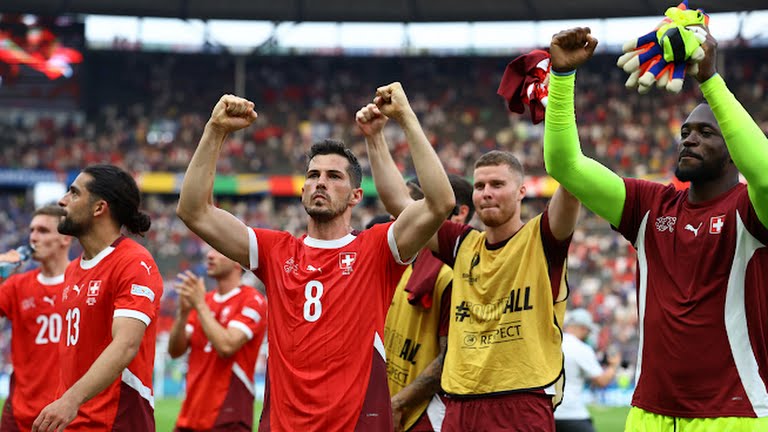In hindsight – and really, only in hindsight – this was how it was always going to end. We still believed, and they still believed, because this was Italy, and for all their foibles and frailties, that name and that crown still count for something. But scarcely can a crown have weighed more heavily. The defending champions are out, and most crushingly they barely threw a punch in the process.
By the end, perhaps the most damning indictment of Luciano Spalletti’s team was that it didn’t even feel like a shock. Switzerland were not just better but braver, not just quicker but slicker, squeezing Italy’s weak spots with a sadistic relish, Remo Freuler and Ruben Vargas with the goals either side of half-time. Italy were overwhelmed for the first hour of this game, and by the last half-hour, when they were finally able to string a few passes together, who cared?
Doubtless there will be fingers pointed and searching questions asked. Perhaps Spalletti will get a little more time, perhaps not. But in a way this was a campaign that deserved to end because it never really began, a title defence that felt off right from the start, that no amount of quirky tinkering, salty insults and impassioned arm-waving could salvage.
You could legitimately point – as Spalletti did afterwards – to the dearth of fit and suitable players available, to the heat, to fatigue, to physical deficiencies, even the standard of talent production in Italian football. Equally Spalletti himself has to shoulder some of the blame here, the suspicion that from selection to tactics to tone, things just got a little crazy: endless changes and pivots, a team spinning and spinning and ultimately collapsing under the weight of its own tortured internal logic.
The result: a defence constantly pointing at each other, a striker who didn’t have a single touch in the opposition half until the 48th minute, a midfield that seemed to be made of little more than tissues and hair. Six changes in a crucial knockout game smelled like panic. Nicolò Fagioli, entrusted with the Jorginho role in midfield, was badly exposed. Gianluca Mancini had a shocker in defence. Stephan El Shaarawy spent 45 minutes frowning like a man who had strolled into the wrong wedding.
If the theory was unintelligible, then the practice was even worse. Pinned back into their own half by Switzerland’s clever lopsided attack, Italy spent large periods of the game simply surviving, biding their time, like a team trying to nurse a lead rather than a team trying to overturn one. The passing was abysmal. The press lacked intensity and bite. Their one clear chance came late on, and Gianluca Scamacca tapped it tamely against the post from five yards.

For Murat Yakin, on the other hand, this was an unmitigated tactical triumph: an aggressive pressing system, clever rotations and patterns, overloads generated with minimum fuss to maximum effect. Ricardo Rodriguez would often advance from left centre-half to form a triangle with Michel Aebischer and Vargas, leaving Italy swamped on that flank: baffled, bereft, pawing at air. Both goals came from that side of the pitch, and as a by-product Federico Chiesa was pretty much neutered as an attacking threat.
And yet until Freuler’s goal it was possible to speculate if Switzerland really had the killer instinct to make their superiority tell. There were near misses, bad decisions, botched final balls. Breel Embolo, one of those strikers who always looks better to the naked eye than his scoring record would suggest, missed a glaring one-on-one chance when he semaphored his intentions to Gianluigi Donnarumma.
But in retrospect, the clock was ticking. Eight minutes before the break Switzerland finally located their composure in the final third: Aebischer with the low cross, Freuler with the well-timed run and slammed finish. Still, half-time beckoned. For Italy, an opportunity for a regroup and a rethink. Some wise words from Spalletti. Roars, fist-bumps and back-slaps in the dressing room.
Then, 27 seconds into the second half, a second Switzerland goal. Italy attempted some elaborate rugby-style kick-off routine, Fagioli gave the ball straight to a Swiss player, and after a simple triangle of passes on the left, Vargas curled in beautifully from the corner of the penalty area. And that was that, really. Italy dominated the closing stages in terms of possession, and Switzerland let them. It was a stasis that suited everybody.
As for the Swiss, this is a team that can genuinely go the distance. The goals have been pleasingly spread across the pitch; the defence with Manuel Akanji at its heart looks teak-tough; Granit Xhaka is three good games away from being a very good shout from the Ballon d’Or. All they really need is the belief that so often deserts smaller nations in the rarefied air of knockout football: so often Switzerland feel like a team that thrive when the going gets tough and regress as soon as conditions improve. A potential match-up against England in the quarter-finals might just bring the best out of them.










More Stories
Amorim insists Fernandes not leaving Manchester United amid Madrid reports
How debt burden pushed Nigerian boxer Segun Olanrewaju to a fight that took his life
Nigeria Taekwondo Federation boss, Abdullahi Saidu dies at 53